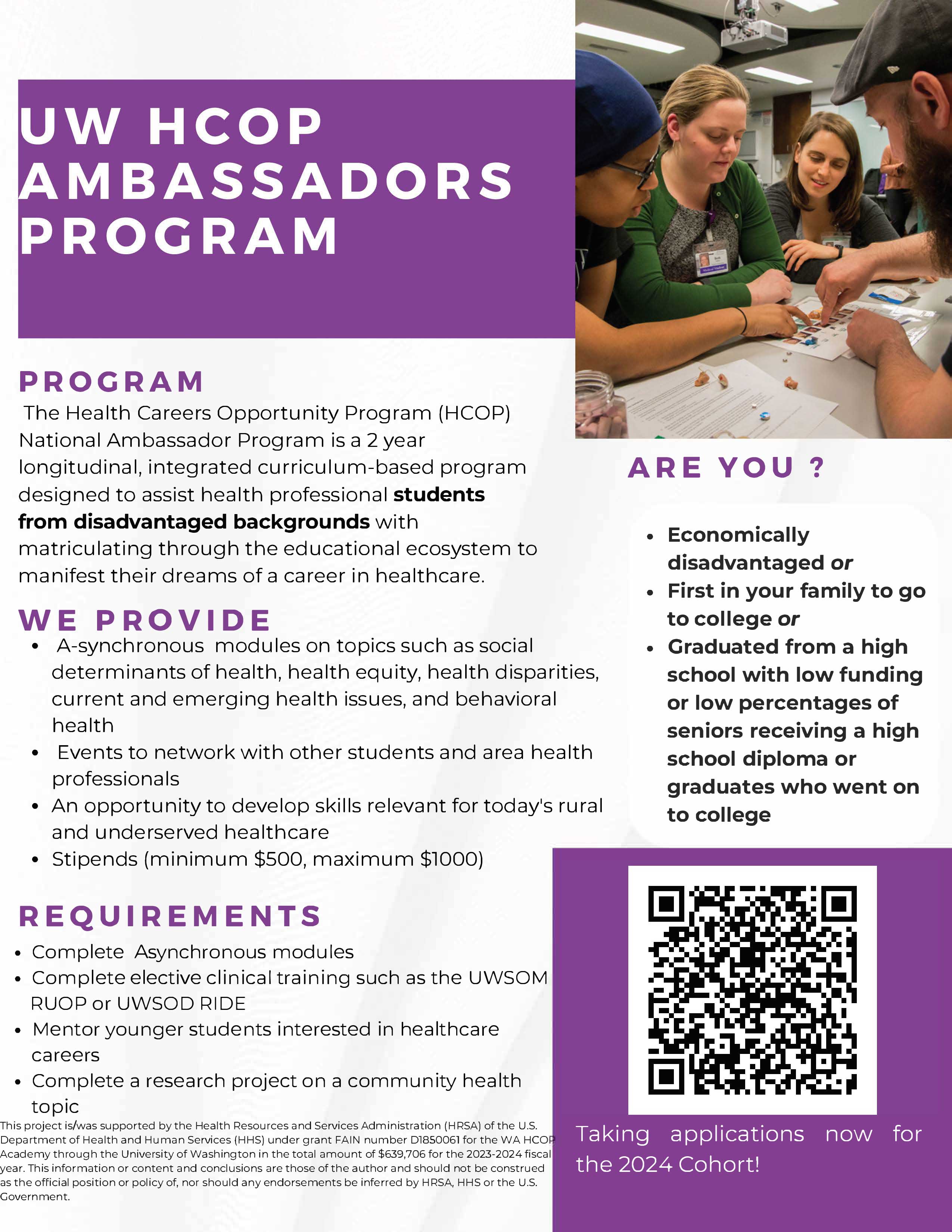Women of Color on Clerkship Support Group meets Monday
The Women of Color on Clerkship Support Group meets online Monday, Feb. 12, 2024, starting at 4 p.m. AK, 5 p.m. PT, 6 p.m. MT. This group offers all self-identified women of color, currently on clerkships, a safe space to connect and support one another in sharing their experiences during clerkships and in personal, academic, and social settings. For more information, contact Student Counselor Satoko Takeda.
Disadvantaged students can apply for new program to explore health care for the underserved
 If you come from an economically or educationally disadvantaged background, a new grant-funded elective program at UWSOM can both help you learn about important topics such as health equity and emerging healthcare issues AND provide a stipend. You will help the community as you learn and engage.
If you come from an economically or educationally disadvantaged background, a new grant-funded elective program at UWSOM can both help you learn about important topics such as health equity and emerging healthcare issues AND provide a stipend. You will help the community as you learn and engage.
The Health Resources and Services Administration (HRSA)-funded UW Health Careers Opportunity Program (HCOP) is seeking applications from students in clinical healthcare professions (medicine, MEDEX, physical therapy and occupational therapy (PT/OT), Doctor of Nursing Practice (DNP), pharmacy, dentistry and social work) who are interested in rural and underserved care, helping their community and supporting their career development. The 2024-2025 HCOP Ambassadors program is 1.5 years with a $1,000 stipend for completion of the program. Applications being taken now for a start in March.
The deadline to apply has been extended to March 1, 2024.
HCOP Ambassadors is an interprofessional program that includes:
- Educational Enrichment: learning about topics such as social determinants of health, health equity, health disparities and current and emerging health issues
- Career Development: Networking with other students and healthcare professionals
Program Requirements:
- Peer to near peer mentoring of high school and undergraduate students aspiring to health careers;
- Completion of an elective clinical training;
- Completion of asynchronous modules on health equity issues;
- Service-learning engagement with community organizations (for medical students, it can be combined with Independent Investigative Inquiry (III) requirement)
Please see this flyer for information about requirements and benefits.
To be eligible, a student should be:
- Economically disadvantaged as defined by Health Resources & Services Administration (HRSA) (See pages 3-4 of this PDF), or,
- Educationally disadvantaged:
- First in your family to go to college, or,
- Graduated from a high school with low funding or low percentages of seniors receiving a high school diploma or low number of graduates who went on to college, or,
- Went to a high school with a large number of students who received free or reduced lunches
“Tip of the Month” from the Career Advising Student Advisory Board
You’re almost done with the Patient Care Phase! Now that you are sorting through your Explore & Focus (E&F) schedule, double-check that it’s set up with enough time off for Step 2 (about 4 weeks, but some students take 6 to 8 weeks depending on your plan with your designated learning specialist) and residency interviews. Six to 8 weeks is preferred.
FYI: Spring C rotation is the last clerkship on the MSPE and this is normal. Summer B is often the last grade on your transcript for your residency application. It’s common for MS4s to have their specialty rotation(s) in the summer quarter, so remember to ask for a Letter of Recommendation (LoR) from your specialty rotation(s). The LoR can be more comprehensive than an MSPE entry. Programs know that specialty rotations are commonly not on the MSPE. Also, you can provide programs with an updated transcript after you submit your residency application if needed!
Ideally, you are narrowing down your career choices to one to two specialties with a secondary specialty until fourth year – if one of the specialties is not family medicine (FM), pediatrics (Peds), or internal medicine (IM). You can meet with your specialty career advisor to review your initial competitiveness, MS4 electives, and, for a few specialties, away rotation planning, including strategies and programs that might be a good fit for you. If you are applying to an away rotation, work on your VSLO application now!
– Written by Updated by Career Advising Student Advisory BIPOC board member L’Oreal Kennedy. Originally written by BIPOC alum Shanelle Briggs
In case you missed it, here is the previous issue of the student newsletter for MS3s.
Have a wonderful week!
